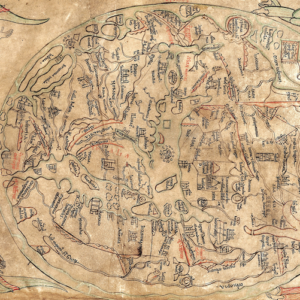Ah, summer reading—the most fraught seasonal category in literature. Is it bad? Is it good? Is it new? Is it old? Is it lowbrow? Is it highbrow? What are brows anyway, after 14 months of pandemic? The word “unruly” comes to mind. So here’s a slightly unruly list for you: 38 novels that will be hitting the bookshelves in these United States between June and August. These are the new books that the Literary Hub staff has read and loved, and thinks you should probably read and love too. What else should summer reading be?
Emily Temple, Managing Editor, recommends:
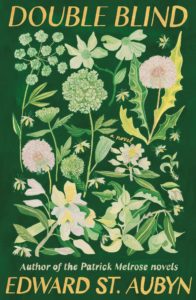 Edward St. Aubyn, Double Blind
Edward St. Aubyn, Double Blind
FSG, June 1
In his latest novel, the author of the Patrick Melrose series brings us a different kind of climate fiction—one that integrates an awareness of the precarious state of the planet with the rest of our human concerns: love, money, and hell, the nature of consciousness. The obvious comparison is to Richard Powers, though of course there is something irrepressibly English about St. Aubyn, and also he’s funnier (at least to me). Usually it’s difficult for a novel to be both emotionally engaging and intellectually stimulating, but St. Aubyn manages it here—I kept turning down the corners of pages where I learned something, or wanted to research further, but I think he’ll be able to charm even those not as keen on didactic passages as I.
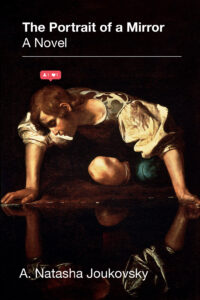
A. Natasha Joukovsky, The Portrait of a Mirror
The Overlook Press, June 1
This delightful, perfectly rendered novel is filled with gossip and charged exchanges, bad decisions made by rich people, but also some pretty interesting questions about art and value, all of it filtered through the legend of Narcissus. (It’s extra fascinating if you’re a New Yorker who didn’t go to prep school or get a job in consulting—what a window.) It’s both a self-aware fantasy and a satire of Beautiful People in New York City, and reading it during My Year of Stress and Resignation, I was beyond charmed. (Full disclosure that I blurbed this book—but only because I liked it so much.)
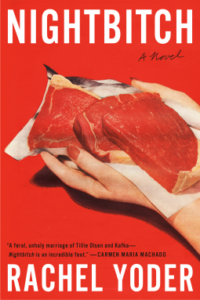
Rachel Yoder, Nightbitch
Doubleday, July 20
I inhaled this delicious bloody feast of a novel, in which an overwhelmed mother begins—or maybe only thinks she begins—to turn into a dog at night. She calls herself . . . Nightbitch. Of course she does. I won’t give too much away here, but yes, she poops on someone else’s lawn. Ultimately, the novel not only manages to be a convincing portrait of modern motherhood, with all the joy and mindfuckery that implies, but also toes the line between clever metaphor and transgressive fantasy, making a convincing claim for both.
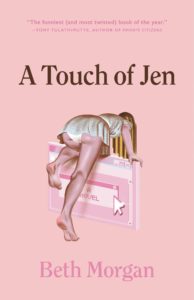
Beth Morgan, A Touch of Jen
Little, Brown, July 13
Um, holy shit. Or maybe it’s better to say: unholy shit. Whether you’re on a post-vaccine rampage or not, this novel will be the most fun you’ll have this summer: a millennial comedy of manners that, just at the point where these things usually fizzle and disappoint, takes A Turn and morphs into a weird horror novel. It’s like if Halle Butler fell asleep watching The Host (the Bong Joon-ho movie, not the Stephenie Meyer adaptation) and this is what she dreamed. I’m realizing that . . . sounds bad, but I don’t want to tell you any more, so look, just trust me on this one.
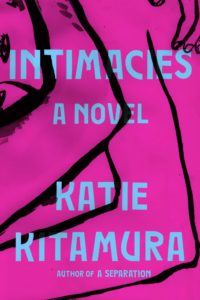
Katie Kitamura, Intimacies
Riverhead, July 20
Katie Kitamura has a knack for creating tension even when nothing, it seems, is going on—a particular magic trick, especially in such precise, even quiet prose. In the novel, a woman who has recently moved to The Hague to work as an interpreter at the international court is faced with an unsettling trial, a destabilizing love affair, and a disquieting connection to an act of violence—when all she is after is a sense of security and home. The result is morally complex, even philosophical, emotionally affecting, and clear as cold water. It sneaks up on you, page by page; by the end I wanted to jump right back in.
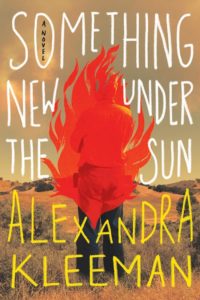
Alexandra Kleeman, Something New Under The Sun
Hogarth, August 3
When Something New Under the Sun begins, Patrick is a writer who has naively accepted a role as a PA on the set of a film adaptation of his novel in lieu of payment. He doesn’t, it is soon clear, have any idea what a PA is. We meet his philosophizing comrades (Horseshoe and the Arm), the problematic starlet (Cassidy) and slowly discover that the California in which they are filming is not quite our own—water has run out and been replaced by WAT-R, a man-made, supposedly chemically identical substance. Because this is an Alexandra Kleeman novel, none of it goes where you think it’s going to, but it’s all so wildly entertaining and beautifully written that it really doesn’t matter where you end up.
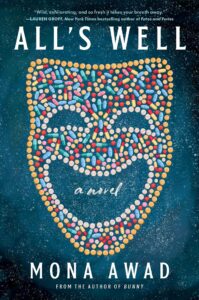
Mona Awad, All’s Well
Simon & Schuster, August 3
On a sentence level, I find Awad’s writing deeply satisfying: readable and tricky and pleasurable—which may have to do with us speaking a similar literary patois infused with Shakespeare and fairy tale logic. So be it. In this novel, a woman wracked with pain that no one can remedy or even really recognize is trying to get her students to put on an unpopular play: All’s Well That Ends Well. But when even walking is a trial, enforcing your will is nearly impossible—until something happens, in fact three somethings, that change the rules of the world. As in Awad’s last novel Bunny, things start off weird and institutional and then spiral into madness, and as in Bunny, the experience is a fiendish delight: funny, thrilling, and creepily recognizable.

A.K. Blakemore, The Manningtree Witches
Catapult, August 10
If you too like to be excited (and disturbed, and amused) by your sentences, I suggest you pick up this tensile first novel by poet A.K. Blakemore, one of at least two great Witch Trial-related novels being published this summer (see below for the other one). This one concerns the sharp-eyed, sharp-tongued Rebecca West and her years-long battle against the terrifying, black-clad Witchfinder General. I’m shivering just thinking about it, but never have I been so glad to be so upset! (Yes, I blurbed this one too. Sorry not sorry.)
*
Katie Yee, Book Marks Associate Editor, recommends:
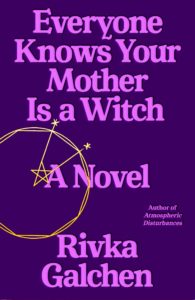
Rivka Galchen, Everyone Knows Your Mother Is a Witch
FSG, June 8
First of all, this title! It’s that perfect combination of snark and the promise of magic. Rivka Galchen’s latest begins with a plague, a war, and an accusation. It’s 1618, and Katharina Kepler is on trial for witchcraft. How else would you explain her herbal concoctions and the fact that her son, born to an illiterate single mother, wrote the book on the laws of planetary motion? Everyone Knows Your Mother Is a Witch is Katharina’s side of the story. It is a tale of communal fear contorted into hatred, the ruin of a family, and the sacrifices we make for those who share our blood. If you’re familiar with Rivka Galchen’s other works (which run the gamut from short story collections to essays on motherhood to a fantastical children’s book), you know her writing always has teeth—this novel, culled from real-life historical documents but blessed with Galchen’s invention and insight, does not disappoint.
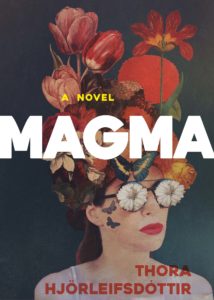
Thora Hjorleifsdottir, Magma
Grove, July 13 (trans. Meg Matich)
The dictionary defines magma as “extremely hot liquid located under the Earth’s surface.” It’s a fitting description for a book about the nuances—the small gestures, the big silences—of a relationship. This novel follows Lilja, a young woman dangerously in love. After all, he quotes dead philosophers and cooks vegetarian meals. (Who among us has not been Lilja?! It’s the relatability that tinges this novel with something sinister.) She plummets further into his life, determined to be good at love, becoming completely subsumed in the process. In beautifully spare prose, Thora Hjorleifsdottir maps their story: the topography of infatuation, the subtle shifts just below the surface, and the seismic ruptures of self. Magma is a powerful excavation of what can go wrong when you love another.
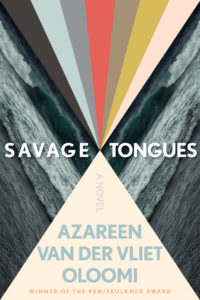
Azareen Van der Vliet Oloomi, Savage Tongues
HMH, August 3
From the award-winning Azareen Van der Vliet Oloomi comes the story of Arezu, an Iranian American teenager who goes to Spain in search of her father, only to find herself in an affair with his step-nephew, a 40-year-old man. Twenty years later, Arezu returns to the place with her best friend (an Israeli American scholar on the side of the Palestinians; an eerily timely detail) to try to make sense of what happened. As a narrator, Arezu is a brutally honest guide through her past. This is a pulls-no-punches look at abandonment, ownership, trauma, and the convergence of political and personal pain. It is also a touching ode to friendship, a partial salve for these wounds.
*
Jessie Gaynor, Senior Editor, recommends:
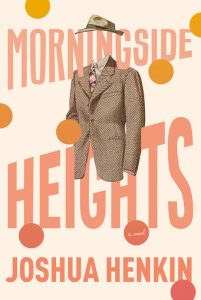
Joshua Henkin, Morningside Heights
Pantheon, June 15
The task of writing the story of a family dealing with the devastating impact of early-onset Alzheimer’s—without veering into sentimentality, or collapsing beneath the weight of melancholy—isn’t an easy one. But Joshua Henkin’s Morningside Heights manages to tell the story of Pru and her husband Spence, once a great Shakespearean scholar and professor, with such deep humanity and kindness that I forgave him for also having managed to write a page-turner (though it still feels slightly unfair to be able to do both). The novel is a portrait of a family in all its complexity and an exploration of care work—both paid and unpaid—the latter of which makes it feel especially timely.

Francine Prose, The Vixen
Harper, June 29
I know book people are wont to throw around the phrase “compulsively readable,” but in the case of Francine Prose’s The Vixen, I can’t help myself. I read it with compulsion. The novel opens on the night of Julius and Ethel Rosenberg’s execution, and despite the benefit of nearly 70 years of hindsight, I still found myself—thanks to Prose’s from-the-jump suspense and pacing—hoping they’ll be granted a reprieve. They aren’t, of course, but the question of their posthumous reputation looms large in The Vixen, told from the perspective of Simon Putnam, a hapless publishing assistant with a tenuous connection to the Rosenbergs, who’s been assigned to edit a thinly-veiled pulp novel about “Esther and Junius Rosenstein,” master spies and unequivocal villains—a novel upon whose success the fate of the publishing house lies. Come for the propulsive mystery and sentence-level tautness, stay for the 1950s publishing mise-en-scène.
*
Eliza Smith, Audience Development Editor, recommends:

Brittany Ackerman, The Brittanys
Vintage, June 15
Some of my fondest summer memories are of hanging out aimlessly in my high school BFF’s basement and “discussing plans for the rest of our lives,” as the narrator of The Brittanys puts it—which is probably why I found this year-in-the-mind-of-a-fourteen-year-old-girl (in 2004, no less) to hit that summer-reading sweet spot. (That, and Pen15 and Teenage Bounty Hunters are my latest TV highlights.) Ostensibly about five Brittanys who attend a Florida prep school (and honestly have way too much money between them), the relationship between the narrator Brittany and Brittany Jensen is at the heart of things, and what a fickle, vulnerable, overflowing heart it is. Simultaneously eager to check off all their firsts and also pining for the simpler days of eating candy and finding boys gross, the girls’ (mis)adventures are fairly torturous to read, but in a good way.
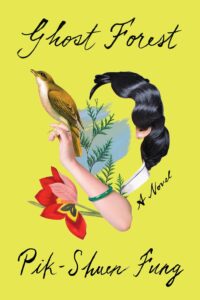
Pik-Shuen Fung, Ghost Forest
One World, July 13
Several summers ago, I read Zinzi Clemmons’ What We Lose in a single afternoon, and reading Pik-Shuen Fung’s debut felt like a welcome replica of that day. Grief is complicated enough, but the protagonist is grieving her “astronaut” father (he stayed in Hong Kong to work while his family immigrated to Vancouver) who was often critical of and confused by his westernized daughter. Composed of vignettes—some of which span generations, some of which made me laugh out loud, many of which gave me Very Strong Feels—Ghost Forest is the tender/funny book we can all appreciate after a hellish year.
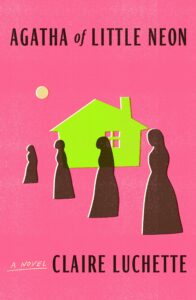
Claire Luchette, Agatha of Little Neon
FSG, August 3
I never knew I needed a book about four Catholic sisters reassigned to a neon-painted halfway house in a former mill town, but reader, I did. Upon their arrival, Agatha is cornered into teaching math at the local all-girls high school (run by hapless, punitive men), where she makes a new friend and carves out a little world for herself away from her sisters. At home, Agatha’s response to the residents of Little Neon is more recognition than religious platitudes, and as stories of abusive priests appear in the news, Agatha finds her anger hard to bear. Luchette’s writing is both wry and earnest, which might be my favorite combination.
*
Dan Sheehan, Book Marks Editor in Chief, recommends:

Lana Bastašić, Catch the Rabbit
Restless Books, June 1
A down-the-rabbit-hole Yugoslav quest novel examining the thorniness of shared memories through the excavation a fraught teenage friendship was always going to be my jam, and Lana Bastašić’s 2020 European Union Prize for Literature-winning debut novel Catch the Rabbit (translated from the Serbo-Croatian by the author herself) did not disappoint. Two estranged women—ruminative Dublin-based narrator Sara and her erratic former best friend Lejla—who came of age in post-war Bosnia, embark on a road trip to seek out Lejla’s long lost brother. This intense, dreamlike, gorgeously-realized descent into history and memory is deserving of its Ferrante comparisons.
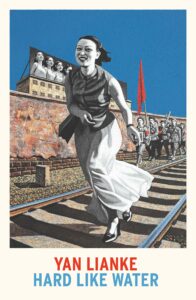
Yan Lianke, Hard Like Water
Grove, June 15 (trans. Carlos Rojas)
The latest novel from acclaimed Chinese satirist and two-time Man Booker International Prize finalist Lianke (The Years, Months, Days; The Explosion Chronicles) is an epic tale of love and lust, betrayal and corruption, set in a reverential village in Henan’s Balou Mountains in the tumultuous days of the Cultural Revolution. The story of an all-consuming (and actively revolutionary) affair between two married party members, it’s an erotic political tragicomedy of Shakespearean proportions.
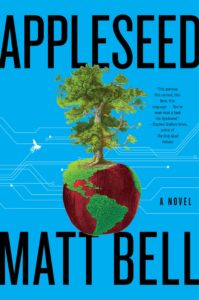
Matt Bell, Appleseed
Custom House, July 13
Do you like apples? Well here’s an epic-but-intimate hybrid of historical fiction, fairy tale, and cli-fi thriller that spans over a thousand years and asks disquieting questions about manifest destiny, climate change, civic duty, and human stewardship of the natural world. How do you like them apples? Over the course of 600 pages, we’re transported from the budding apple orchards of 18th-century Ohio to the frozen tundra of post-snowpocalypse America. Bell’s terrifying yet deeply humane novel of ideas is both an awesome work of imagination and a stirring ecological call-to-arms—a reminder of what the best genre-bending books can achieve.
*
Vanessa Willoughby, Assistant Editor, recommends:
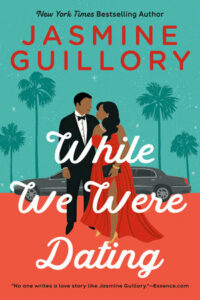
Jasmine Guillory, While We Were Dating
Berkley, July 13
Jasmine Guillory has established a track record of writing swoon-worthy contemporary romance that spotlights people of color; her endearing heroes and heroines grapple with race and racial identity in a way that feels true-to-life rather than ABC after-school special. While We Were Dating centers on Ben Stephens, a driven advertising exec, and Anna Gardiner, an in-demand movie star. (Some readers may recognize Ben as Theo’s brother from The Wedding Party.) Against the glittering backdrop of Los Angeles, Ben and Anna find themselves falling for each other. Their courtship is the stuff of classic rom-coms, with fake dating schemes, miscommunication, and delightful banter. Once again, Guillory offers a charming romance grounded in reality. There are also frank discussions of mental health issues and attending therapy.
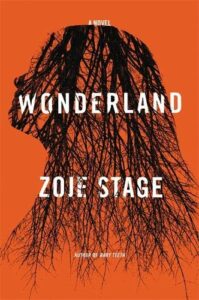
Zoje Stage, Wonderland
Mulholland Books, July 20
Stage’s chilling follow-up to Baby Teeth (2018), now in paperback, takes on the topics of parenthood, domesticity, and the natural world. Orla Moreau, 41, used to be a ballet dancer in New York. However, the time has come to hang up her pointe shoes and retire. Orla and her husband, 38-year-old painter Shaw Bennett, and their two young children move to a farmhouse deep in the Adirondacks. Soon thereafter, their dreams of quiet countryside living become unrecognizable. Who—or what—is preying on the family? Stage’s novel elevates familiar horror tropes (isolation in the wilderness; haunted houses; the terror of the sublime), culminating in an unsettling portrait of a family in crisis.
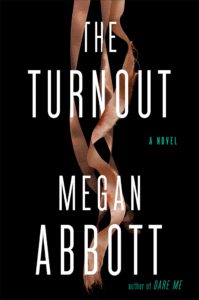
Megan Abbott, The Turnout
G.P. Putnam’s Sons, August 3
Megan Abbott’s latest novel captures the psychological paranoia of Black Swan and the toxic sibling rivalry of Whatever Happened to Baby Jane? Sisters Dara and Marie Durant, former ballerinas turned ballet instructors, inherit their family’s modest ballet studio after the unexpected death of their parents. Dara and Marie couldn’t be more different. Steely-eyed Dara is the “dark” to dreamy, childish Marie’s “light.” The pair are locked in their roles, obediently executing the traditions established by their mother. Every year, the studio performs The Nutcracker—a considerable feat of planning, time, and money. However, their routine is upended when a fire nearly burns down the school. To repair the damage, the sisters hire a recommended contractor. The contractor’s arrival kicks off the deconstruction of their carefully curated lives. The Turnout unfolds like a dark fairy tale, unpacking the rigid demands of femininity. Abbott fans and suspense lovers alike won’t be disappointed with this exploration of human frailty and twisted love.
*
Emily Firetog, Deputy Editor, recommends:
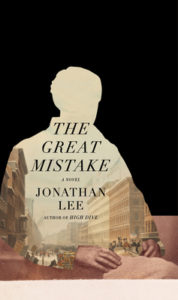
Jonathan Lee, The Great Mistake
Knopf, June 15
It’s the perfect time to read a great New York novel, and Jonathan Lee’s The Great Mistake fits the bill. In 1903, at the age of 83, Andrew Haswell Green is shot dead on Park Avenue in broad daylight (not a spoiler, it happens on page one). Green—real-life architect of Central Park, the Museum of Natural History, the New York Public Library, and the Brooklyn Bridge—is a city in a man, a window both onto a particular time in New York’s history and into something more ineffable and beguiling: its soul, its secrets. Green’s life is stuffed to bursting with adventure and incident (from his dirt-poor beginnings on a failing Massachusetts farm to his apprenticeship in Trinidad and ascent through New York society as he prosecutes his single-minded quest to become “an elegant man”), and the investigation into his death is peopled with a vivid cast of crooked politicians and prostitutes and gunmen. The Great Mistake is utterly immersive, surprising, and real.

Doireann Ní Ghríofa, A Ghost in the Throat
Biblioasis, June 1
First published by Tramp Press—a small-but-mighty Dublin-based independent responsible for such contemporary classics as Mike McCormack’s Goldsmiths-winning Solar Bones and Emilie Pine’s Notes to Self—A Ghost in the Throat is the first prose work by poet Doireann Ní Ghríofa. Ghost braids together the history of the great 18th century Irish poet Eibhlín Dubh Ní Chonaill (murdered husband, drinks his blood, writes a masterwork Caoineadh Airt Uí Laoghaire) and a thoroughly contemporary autofiction centered on a young mother narrowly avoiding her own fatal tragedy. It is a book of expansive sympathy and hard intelligence that enacts as it explores the sustaining power of encountering a truly original voice. Ghost investigates the identity-shaping, culture-encoding power of both the English and Irish languages, ruminates on literary obsession, motherhood, and self, and is one of the best books I’ve read this year.
*
Corinne Segal, Senior Editor, recommends:

Mohamed Kheir, Slipping
Two Lines Press, June 8 (trans. by Robin Moger)
The world of Slipping, Mohamed Kheir’s challenging, fantastical novel set in post-Arab Spring Egypt, is one where the boundaries between history and myth, dreaming and waking, are constantly in flux. Through the character of Seif, who embarks on a journey to understand what happened to his lover—and, in the process, encounters a series of stories that belong to the realm of magic—Kheir explores the beautiful and intangible: a part of the Nile where people seem to walk on water, a woman who can sing any sound, a plague of falling corpse flowers, and more. Only Kheir’s intricate prose, and Robin Moger’s deft translation from the Arabic, could tell this story; this is the book that all the indie booksellers I know are raving about right now, and with good reason.

Benjamin Villegas, ELPASO: A Punk Story
Deep Vellum, June 29 (trans. by Jay Noden)
This is the story of a band that no one knows, who never did “anything anyone would remember.” Benjamin Villegas’ narrative, which blends biography with fictionalized scenes and memoiristic vignettes, was inspired by the story of ELPASO, a Chicano punk band from El Paso, Texas, that made two recordings between 1985 and 1990 before dissolving. Villegas takes their obscure story as the jumping-off point for a larger exploration of rock ‘n roll in America, a scene that, as he points out, is largely composed of bands that never made it, but contributed to the culture all the same. Translated from the Spanish by Jay Noden, this book is as unpredictable as it is fun, veering into long-neglected corners of punk history as it welcomes the reader “to the underground experience.”
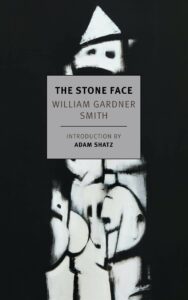
William Gardner Smith, The Stone Face
NYRB, July 13
William Gardner Smith started writing The Stone Face in 1961 while living in France, at a time when ongoing tensions over the Algerian War meant that anti-Arab racism and violence suffused every part of daily life. The book, based on his firsthand observations, follows a young man who, like several other Black writers of the era, seeks refuge from the racism of Jim Crow America by moving to Paris; once there, as he observes the treatment of Arabs in his midst, he begins to question his own complicity in an anti-Arab society. A complex exploration of power and justice, the book—which also includes one of the first published accounts of the Paris massacre of 1961—was first printed in 1963 and is being reissued this summer from NYRB, not a moment too soon.
*
Walker Caplan, Staff Writer, recommends:

Andrew Palmer, The Bachelor
Hogarth, July 21
This impressive debut is a perfect read for a summer of regrouping. Our narrator, nearly thirty and aimless in the wake of a breakup with his novelist girlfriend, moves back to his hometown of Des Moines and rents his mom’s friend’s house. Instead of writing, as was his plan, he spends his time watching The Bachelor and digging into a biography of John Berryman—that is, when he isn’t looking for love among the (sharp, specific, three-dimensional!) women he knows. The narrator’s compulsive self- and cultural analysis is refreshing rather than tedious; in Millennial Consumer Culture World, we rarely see main characters that consume culture with genuine, reasonable love. It’s a funny, smart, quietly beautiful novel about the search for narrative—in art, in work, in life.

Ash Davidson, Damnation Spring
Scribner, August 3
This ambitious, assured debut drops us into a 1977 Pacific Northwest logging town clinging to their way of life as their land is razed around them. Midwife Colleen starts to suspect the herbicides used in logging are the cause of her and other women’s miscarriages; but while she seeks answers, her husband Rich, unbeknownst to her, spends their family’s savings on purchasing the land on which he works. Meanwhile, a burgeoning environmentalist movement threatens loggers’ livelihoods. Told in alternating points of view from Colleen, Rich, and their son Chub’s perspective, it’s a devastating page-turner with a love story at its center.

Jo Hamya, Three Rooms
HMH, August 31
The narrator of Jo Hamya’s debut novel has a familiar goal: to “afford a flat, not just a room, and then to settle in it and invite friends to dinner.” But as a 21st-century worker, a path there—to stability, independence, permanence—seems near impossible. We follow the narrator from living in a rented room at Oxford as a research assistant, to a rented couch as a temp at a high-powered magazine, to finally, exhausted, moving back in with her parents. (Hamya gives us send-ups of academia and media along the way.) It’s an anti-coming of age story, a bleak portrait of a generation for whom a “room of one’s own” lingers permanently out of reach.
*
Julia Hass, Contributing Editor, recommends:
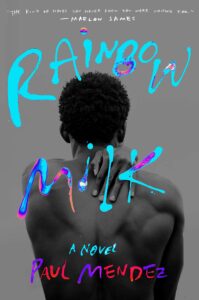
Paul Mendez, Rainbow Milk
Doubleday, June 8
Rainbow Milk follows a young boy named Jesse, born into a family of Jehovah’s Witnesses, as he seeks to understand his place within his family, religion, and the world, as a Black, queer boy. It is a stunning text about the body, specifically the Black male body, and the history the body must confront and break apart from, in taking control of its own narrative. This idea parallels Jessie’s musings on writing—how it won’t necessarily save him, but will allow him to be the author of his own story, which is a kind of power that was previously unimaginable. There is no subject that Mendez doesn’t take on with frankness and warmth: race, class, sexuality, religion, nothing is taboo, and nothing is too much, in this resolutely human story of growing up and growing into yourself. It’s no wonder Paul Mendez’s debut novel was released to such critical acclaim in the UK last year, and hopefully it will enjoy the same reception here.
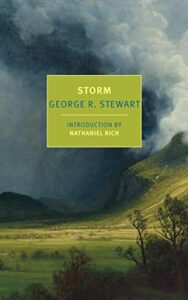
George R. Stewart, Storm
NYRB, August 17
The landscape of California and its accompanying weather turmoil (drought, lightning, fire) is no new subject these days, but it was in 1941 when George Stewart wrote this novel. The main character is Maria—the storm itself—who is depicted as both human and otherworldly, as she gathers her forces and makes her way from Japan to the West Coast, crossing paths with the citizens of the places she lands. Storm is considered the first of its kind, paving the way for an entire genre of fiction, the eco-novel. Fans of The Overstory will be transfixed with this reissue, which follows the storm every day of its existence as we would a volatile and dramatic character, and leaves us with a renewed awareness of the interconnectedness of our mysterious and awe-inspiring world.

Lisa Taddeo, Animal
Avid Reader Press, June 8
There is a theme emerging in contemporary fiction: a focus on women, anger, violence, and all things uncontainable. This is unsurprising after the past four years we’ve endured, not to mention the rest of history under patriarchy. You may know Taddeo from her groundbreaking book, Three Women, which examined how the sex lives of contemporary women have been used and shaped from the cultural ground we stand on, but where Three Women was nonfiction, Animal breaks free of the bounds of reality. Animal (with echoes of Promising Young Woman) growls a feral truth, a promise of revenge, and an untold story of rage, and a reckoning.
*
Jonny Diamond, Editor in Chief, recommends:
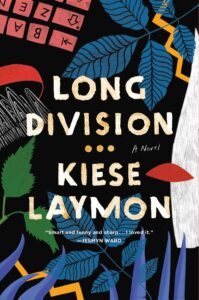
Kiese Laymon, Long Division
Scribner, June 1
You would be forgiven for thinking Long Division (originally published in 2013) was a novel of the current moment. And no, I am not talking about its painful, sometimes brutal conjurings of American anti-Black racism (that’s been “current” in this country for centuries), but rather its undeniable quality as an “Internet novel.” It’s not just for the obvious reasons (the upending of the main character’s life by a moment of YouTube virality) that Long Division feels like it exists in the digital imaginary—there’s something far subtler going on. The novel has a contingent, almost unreliable narrative structure built from temporal jump cuts that make you feel like you’re watching someone who’s been online for 48 hours, who can’t stop clicking through hyperlinks deeper and deeper into a subject they don’t quite understand…
The “someone” in question is Cityoen (City), an Alabama teen with a predilection for language (“sentences”) who finds himself in some very weird circumstances after heading to his grandmother’s to escape new and unwanted viral notoriety. What follows is a truly strange and original narrative ride led by the deeply sympathetic City, a character Laymon has drawn with equal measures of vulnerability and swagger, and who deserves a place in the great American pantheon of first-person narrators.

Chris Offutt, The Killing Hills
Grove, June 15
The fine dark art of the noir simile springs from the amoral beauty of the Icelandic sagas, flows forward in time through the savant, poetic solecisms of Raymond Chandler, and drains into the rich, black soil of Chris Offutt’s high holler novels. I am not an avid reader of thrillers—The Killing Hills is definitively that, pitched at the highest literary register of the genre—so I would have loved this book if it were nothing but interstitial scene-setting and character development. Even if it hadn’t started with someone finding a body up in the eastern Kentucky hills near a patch of ginseng, I would have enjoyed the story of Mick Hardin, an Army CID agent (basically a detective) who’s comes home to Eastern Kentucky to discover a pregnant wife (surprise!), a murder in the hills (oh no!), and an assortment of kudzu-thick entanglements, with family and foe alike.
Offut nails that deep country, small-town quantum paradox wherein local solidarity shimmers into suffocating claustrophobia and back again before you know it. And though The Killing Hills is vividly evocative (in very traditional ways) of life in deep woods Appalachia, Offut doesn’t flatten any of his characters into working class stereotypes, but rather presents the full range of human (in)decency that can be found among any given group of people, no matter where they live or what the material circumstances of their lives might be. This, on its own, is an important corrective to so much of American popular culture. That it all comes in a riveting, page-turning package is truly a gift.
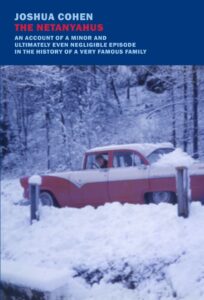
Joshua Cohen, The Netanyahus
NYRB, June 22
Whoever bet Josh Cohen he couldn’t write a convincing and thoroughly entertaining midcentury campus novel, somewhere between Saul Bellow and Kingsley Amis—with a vulgar streak of Roth for good measure—deserves his bar tab picked up for a night. The Netanyahus (spoiler: yes, those Netanyahus) aren’t exactly the main characters, here, but rather exist for much of the novel as an approaching weather system, a storm on the horizon of Ruben Blum’s life, the intensity of which he is thoroughly unprepared for. Blum is an unassuming history professor—who specializes in taxation!—at an upstate New York college to where he’s dragged his urbane wife and teenage daughter, making them the only Jewish family on campus. The novel, spun from an anecdote told to Cohen by the late Harold Bloom, is set in 1960, though the Cornell-esque campus is decidedly stuck in the previous decade. It is for this reason that Blum is called into the very WASPy department head’s office to deal with the impending arrival of Benzion Netanyahu (father of Bibi), a wandering specialist of early Medieval Spain, the suitability of whom—it is assumed by the old line history faculty—can only be judged by a co-religionist. It does not take deep exegetical acuity to see that chaos is on its way.
Though very much a period piece, Cohen somehow renders the hypocritical banalities of midcentury American faculty politics in a way that feels very 21st century, without once using the word “cancel.” This narrative sleight-of-hand is both testament to the unchanging smallness of academia and Cohen’s restless, almost irritable erudition, a condition made bearable only by his sense of humor. When that storm finally hits, it comes with not just one Netanyahu, but many, and it is torrentially satisfying—at least to read about.

Omar El Akkad, What Strange Paradise
Knopf, July 20
Perhaps we need a new micro-genre to describe the work of Omar El Akkad, who builds impossibly taut, thriller-like narrative structures around deeply complex moral problems (“moral thriller” might not sell books, but that’s what we’re talking about). In What Strange Paradise—the tale of a Mediterranean migrant journey gone wrong—El Akkad sets his chorus of moral actors adrift (literally and figuratively) on the desperate seas of refugee misfortune and removes the luxury of anything resembling binary certainty. Some of these characters reveal innate goodness, while others display breathtaking indifference to the suffering of others; and yet in El Akkad’s moral universe, no one is judged, and no one is made into a monster.
If anything is definitively monstrous in What Strange Paradise it is the larger dehumanizing systems—those global, tidal forces of money and power—that render individual, moral choice a quaint, fairy tale redundancy. But just when things seem impossibly bleak, amid the ongoing apocalypse of contemporary global displacement, El Akkad allows for the possibility of hope in individual moral choice, reminding us that any given life is simply that, a collection of hard choices, for good or for ill.
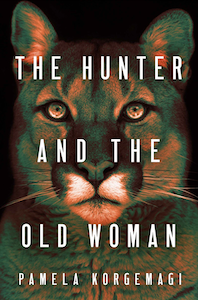
Pamela Korgemagi, The Hunter and The Old Woman
House of Anansi, August 3
As much as we like to give ourselves credit for understanding the role of the natural world in the equilibrium of the planet we are, ultimately, a destabilizing and delusional species—we put ourselves at the center of the story, and treat our environment like cheap background scenery. The Hunter and The Old Woman goes some small way toward redressing this narrative imbalance, offering parallel protagonists—as advertised by the title—whose lives seem destined to intersect from the moment they’re born. The eponymous Old Woman, however, is a cougar who inhabits an almost mythic forest realm at the far edges of the human world.
Korgemagi has written The Hunter and The Old Woman as a kind of realist parable, and unapologetically anthropomorphizes the animal characters, giving them what we might think of as “emotional range.” This is a bold decision, and I can imagine some readers taking issue with it out of an overdeveloped sensitivity to… well, I don’t know what exactly: the idea that there is a correct way to embody cougar consciousness in a novel is absurd. By dispensing with the syntactical ticks that sometimes pass for non-human ideation in fiction, Korgemagi deftly elevates—and equalizes—the emotional stakes of her dual protagonists. And though we know they’re stand-ins for the cyclical collisions of Man and Nature, the parallel fates of these fully drawn characters, The Hunter and The Old Woman, feel intimate and urgent. (If only we could be made to feel this way about the fate of the natural world.)


